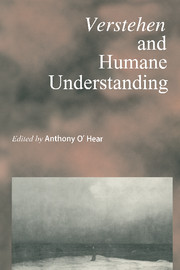Book contents
- Frontmatter
- Contents
- Notes on Contributors
- Preface
- ‘Two Cultures’ Revisited
- Rational and Other Animals
- Vico and Metaphysical Hermeneutics
- Three Major Originators of the Concept of Verstehen: Vico, Herder, and Schleiermacher
- Weber's Ideal Types as Models in the Social Sciences
- Verstehen, Holism and Facism
- Interpretation in History: Collingwood and Historical Understanding
- The Meaning of the Hermeneutic Tradition in Contemporary Philosophy
- Science and Psychology
- To Mental Illness via a Rhyme for the Eye
- Can There be an Epistemology of Moods?
- Feeling and Cognition
- Believing in order to Understand
- Data and Theory in Aesthetics: Philosophical Understanding and Misunderstanding
- Anti-Meaning as Ideology: The Case of Deconstruction
- Perictione in Colophon
- Index of Names
To Mental Illness via a Rhyme for the Eye
Published online by Cambridge University Press: 17 May 2010
- Frontmatter
- Contents
- Notes on Contributors
- Preface
- ‘Two Cultures’ Revisited
- Rational and Other Animals
- Vico and Metaphysical Hermeneutics
- Three Major Originators of the Concept of Verstehen: Vico, Herder, and Schleiermacher
- Weber's Ideal Types as Models in the Social Sciences
- Verstehen, Holism and Facism
- Interpretation in History: Collingwood and Historical Understanding
- The Meaning of the Hermeneutic Tradition in Contemporary Philosophy
- Science and Psychology
- To Mental Illness via a Rhyme for the Eye
- Can There be an Epistemology of Moods?
- Feeling and Cognition
- Believing in order to Understand
- Data and Theory in Aesthetics: Philosophical Understanding and Misunderstanding
- Anti-Meaning as Ideology: The Case of Deconstruction
- Perictione in Colophon
- Index of Names
Summary
The intellectual journey on which I am about to embark, although not an unusual one in philosophy, may at first seem strange to those who are in the habit of looking to science for the answers to their big questions, including their philosophical questions. For I propose to shed light on the problematic relationship between two things, namely, mental illness and physical illness, by comparing their relationship to the relationship between two other things, namely, a rhyme for the eye—which will be explained shortly for the benefit of anyone unfamiliar with this concept—and a rhyme for the ear. Yet these two pairs of things are not related in any way by subject-matter. In philosophy, however, this sort of deliberate dislocation can be beneficial. As Wittgenstein himself once remarked, ‘A philosophical] problem can be solved only in the right surrounding, we must give the problem a new surrounding, we must compare it to cases we are not used to compare [sic] it with.’
To someone who is used to treating only scientific enquiries as serious enquiries my extended comparison between two such entirely different pairs of concepts may sound misguided, even frivolous. But a conceptual investigation is a very different sort of thing from a scientific investigation and I shall take heart from the words of a short untitled poem by Emily Dickinson which remind us of the existence of a kind of truth which is so disconcerting to its intended audience that, if it is eventually ever to do them any good, it needs to be presented to them gradually.
- Type
- Chapter
- Information
- Verstehen and Humane Understanding , pp. 165 - 190Publisher: Cambridge University PressPrint publication year: 1997



